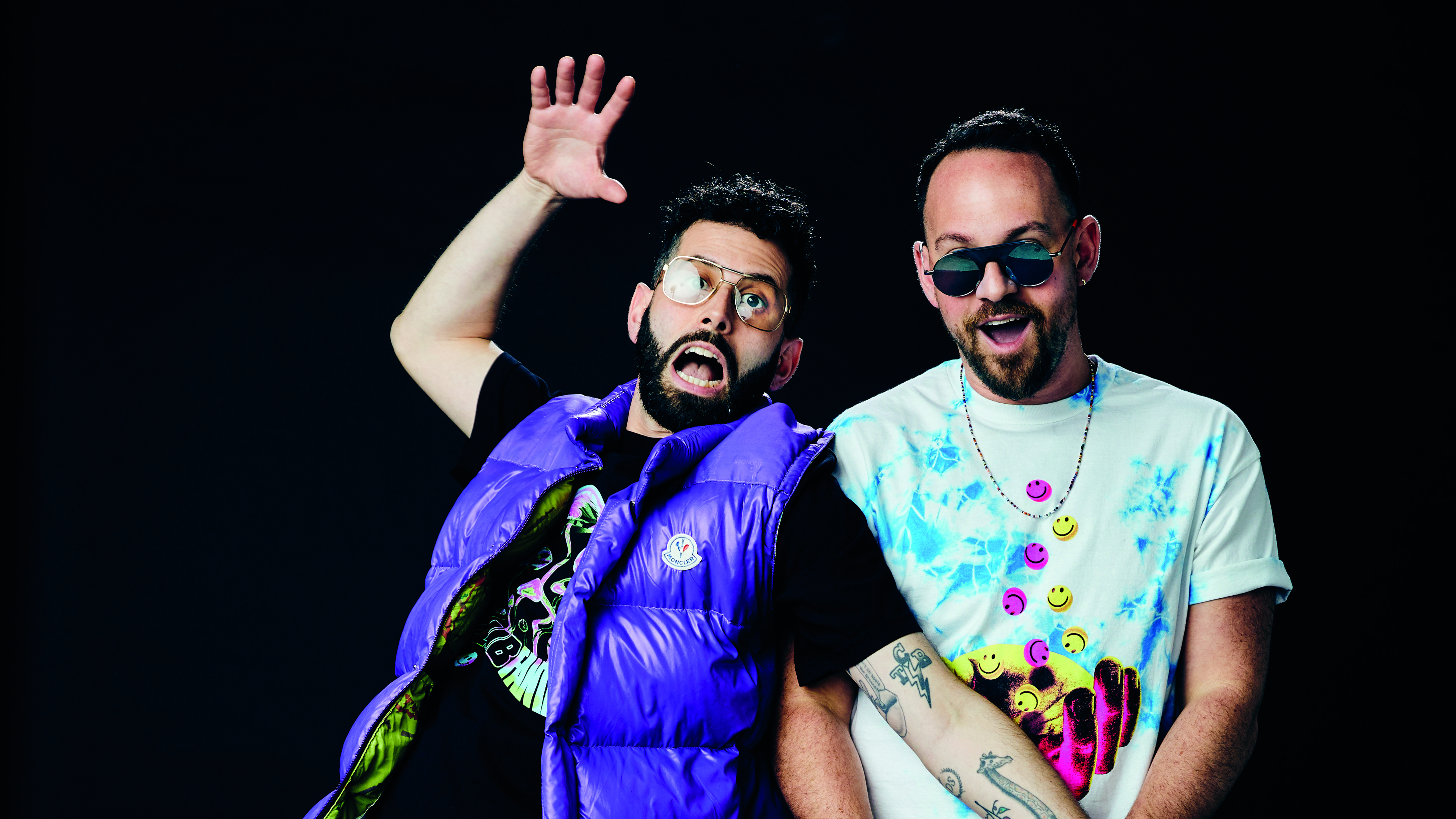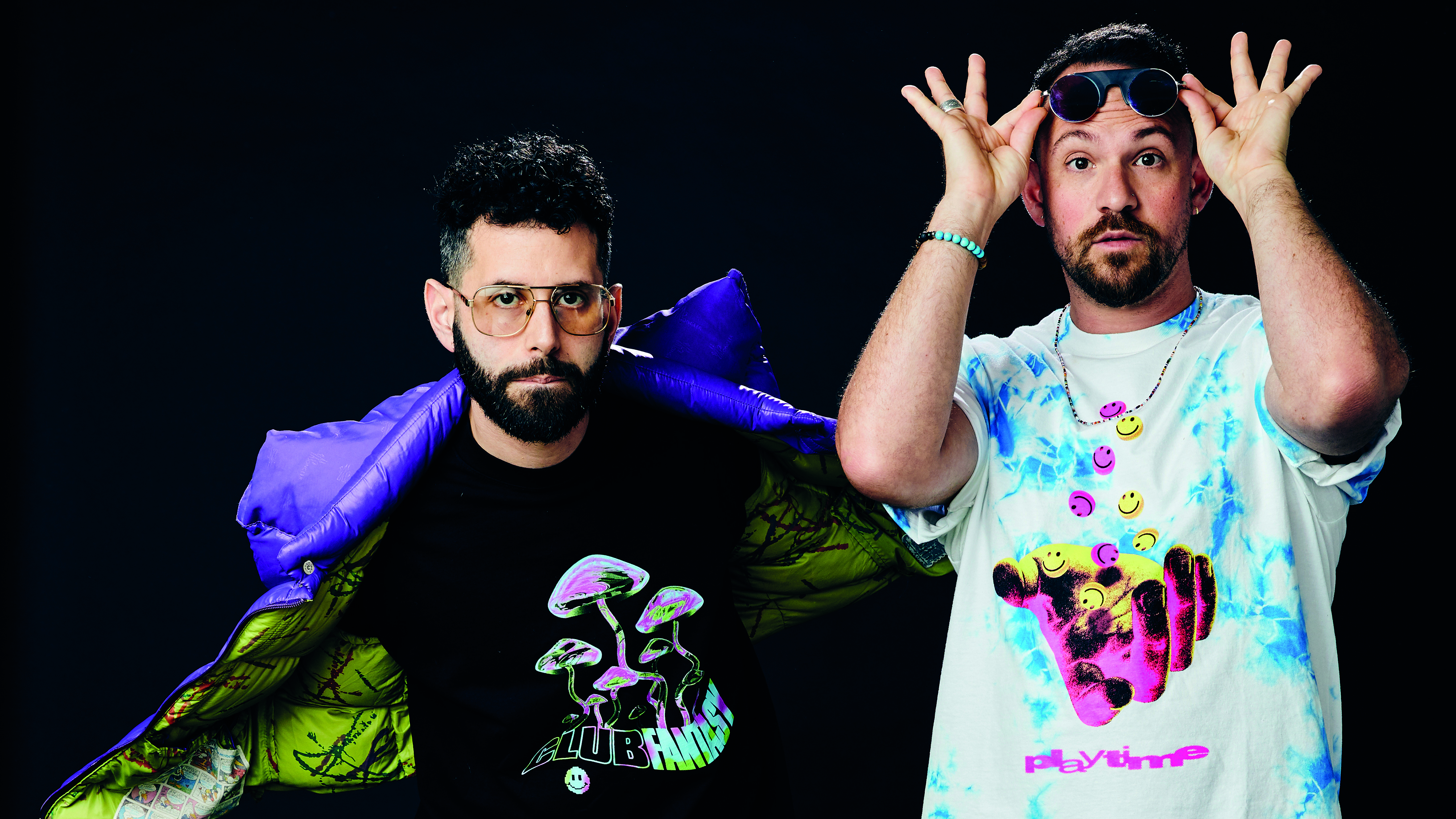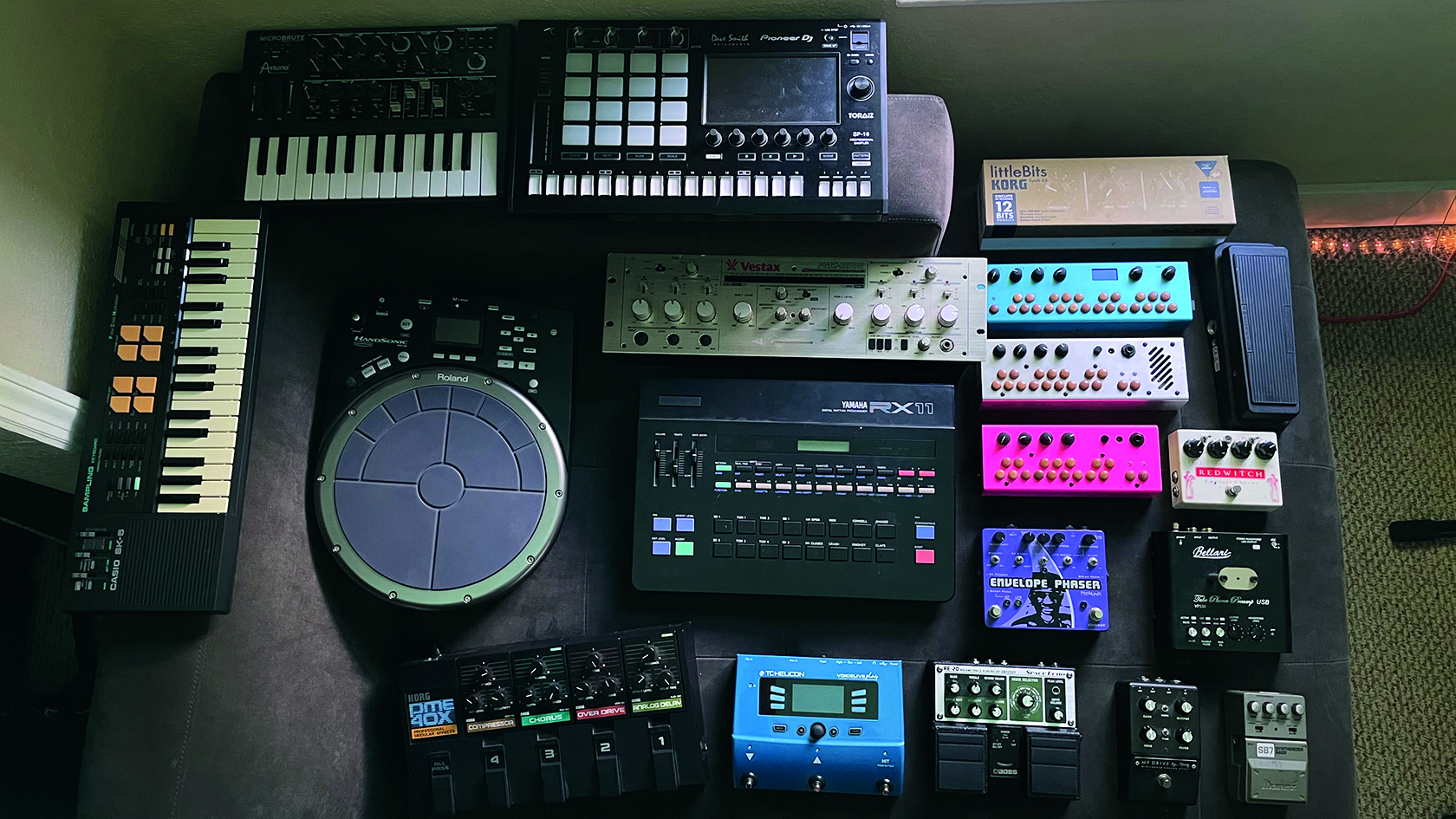Soul Clap: "We probably do step on each other's toes, but it couldn’t be any worse than Fleetwood Mac or The Stones"
Charlie Levine and Eli Goldstein's new album is founded on a passion for environmental and social activism

Want all the hottest music and gear news, reviews, deals, features and more, direct to your inbox? Sign up here.
You are now subscribed
Your newsletter sign-up was successful
Soul Clap’s Charlie Levine and Eli Goldstein originally hailed from Boston’s local DJ party circuit, gathering quick acclaim for their bootlegs and house remixes.
Fusing multiple generic elements with futuristic production techniques, their debut album EFUNK demonstrated a bold electro-funk sound, followed four years later by the self-titled Soul Clap - described as a skyscraper of jazz-infused influences.
Disturbed by political and environmental issues, the self-taught duo’s third album, WTF (World Transformation Force) exhibits their activist leanings. A diverse body of work – and undoubtedly their most sophisticated album to date, the messaging affirms Soul Clap’s commitment to global change, aligned to their multi-generic spin on underground house.

It’s been about five years since your last album. Did the pandemic accelerate your desire to make a new one?
CL: “We actually finished this album before the pandemic and were wrapping it up in Los Angeles as the news spread that there might be a situation going on. I remember sitting in the studio with producer Lee Curtis at the helm and Eli standing behind him receiving a text from his wife about everybody having to be ‘quarantined’. I looked at them as if to say ‘she’s crazy’, but she was right on the money.”
EG: “It’s interesting that the whole concept and narrative of the album was pre-pandemic and pre-George Floyd protest, so these were already subject matters that we were thinking about and now seem to be quite pertinent and timely.”
So the year-long delay in release was more due to not being able to tour or promote the album?
Want all the hottest music and gear news, reviews, deals, features and more, direct to your inbox? Sign up here.
CL: “It was more about having this luxury called ‘time’. Touring is connected to it because as you’re finishing an album there’s already plans for its release with deadlines set for the artwork, mixing and mastering.
"Because we didn’t have to tour this time, we could spend an extra month having Zoom meetings with our mix and mastering engineers to really get things sounding perfect. We also took time to find the right label rather than putting it out independently.”
World Transformation Force is quite an idealistic-sounding title. What’s the meaning behind it?
EG: “Through the process of writing the music and figuring out the story of the album we decided that we wanted it to have an element of activism and push for positive change. Everybody has this idea that there are a lot of fucked up things in the world, but we feel music can help us to recognise them and push forward.
Dance music has become such big business that it’s lost a lot of the messaging that was rooted in subversive music by marginalised people.
"For me personally, going back to school to study climate science is an extension of the work we’d already been doing. Over the past five years, we’ve both become increasingly concerned but feel we can take more responsibility and share positive messaging through our platform.”
CL: “Anyone in the arts can stand on a soapbox and tell others what to do, but I respect how Eli has used his studies to develop an educated outlook and use his informed opinion. As a duo, we like to practise what we preach and be true to the songs we write in the way we live our lives.”
EG: “Dance music has become such big business that it’s lost a lot of the messaging that was rooted in subversive music by marginalised people. Disco was partially distilled by the Stonewall riots for gay rights in New York, and in the ’90s you had subversive ideas coming from Deee-Lite in the US or Future Sound of London and KLF in the UK. We feel these legacies need to be respected and hope we can build those narratives back up again.”
How did you work with vocalists Nona Hendryx and Rich Medina to get their spoken word messaging across?
EG: “We’ve been working with Nona for years and produced her most recent EP. She’s a real inspiration - a renaissance woman who works with technology and music and has already been an activist. We’d written an instrumental and had a manifesto for the whole album, which helped her write the lyrics to What If There Was No America?
"With Rich, we got together in a studio in Brooklyn, talked through the ideas and he wrote the poetry, but it was very much a collaborative creation.”

Your music’s very mood driven, in a positive way, but did you feel the need to downplay that positivity this time?
CL: “There’s definitely a message of hope. When you’re revealing social and environmental issues it can feel very bleak, but we want people to walk away feeling they’re part of this transformation force.
"In the past we’ve been quite whimsical with our music, but while some of the lyrics feature some heavy stuff, there’s still an underlying message of love and hope, and plenty of party tracks on there.”
As you’ve matured do you feel you’re able to move towards a more expansive sound that no longer needs to pay homage to specific genres?
EG: “I feel like we’re always paying homage, both to our advantage and our detriment, but this time we set out to make music that was slightly more instrumental-based. On most of our albums we’ve ended up having all vocal tracks, which is pretty cool, but we also have this DJ side that loves dubs and instrumentals, so on tracks like Enough is Enough, Peace Love Unity Respect and Breathe we were trying to make them in the deep house instrumental tradition.”
The drum programming and sampling was influenced by your live performances. Was this reflected in your approach to recording?
EG: “The initial ideas came together in Charlie’s teeny bedroom studio in Miami. We plugged in a bunch of synths and used the sampler we’d used for our 2017 live sets to get the ideas going, then just hit record and lay down the tracks. They grew a lot from that initial point, but that live feeling was a big part of the arrangement and programming.”
CL: “The goal was to go through a process whereby Eli and I can recreate these songs in a way that will take the Soul Clap experience further in a live performance context. It’s something we increasingly intend to do as we move forward.”
Perhaps by extension Charlie, you’ve actually been studying instrumental music?
CL: “I started taking piano lessons because I didn’t have a music theory background. My tuning is good enough that I can sing a melody for someone to play or hear when something in the production’s clashing, but I really wanted to be able to speak the language of communication with other musicians.
"There was an amazing moment in our career when we were rehearsing this incredible hybrid between Soul Clap and Amp Fiddler on the main stage at Movement Festival. The performance was awesome, but at one point Amp looked over to me and said, ‘Yo man, you need some lessons!’ Amp was totally right so I asked if he could recommend someone to teach me.
"Through his jazz Detroit inner circle he got to Sharp Radway and I’ve been taking weekly lessons with him over Zoom.”

What have you learned from Sharp?
CL: “Modal theory, inverted fingering with two hands, interesting chord voicings and ways to express certain basic chord progressions that I can apply to keys. It’s about hearing something then knowing where to go and how to get there - imagine you’ve got the Ferrari but you don’t know how to hit the gas!”
Would it be fair to say that most of your gear is located in your studio, and therefore Eli typically visits you to work on music?
CL: “In order to get to any Soul Clap album it has to be the two of us working together, but it’s fair to say that I’ve taken the lead on getting the productions off the ground during their early inception. On this album, however, we really felt that we needed to get in the same room and come up with these ideas together.”
EG: “The first album we wrote in Miami over the period of a month, the second one was mostly in Charlie’s loft in New York and this one was made back in Miami now that Charlie’s back there. Out of the two of us he’s the studio rat, but although I’ve been on pause right now at school, I’ve got my own studio setup and get super into that as well.”
CL: “I’ve got a lot of gear here but Eli’s got some pretty crazy pieces. He’s got the Roland Jupiter-8 that we bought when we were in Japan and I sent him the Korg M3 workstation and a bunch of Roland boutiques.”
Do you find you work better together if you avoid treading on each other’s toes?
CL: “In the beginning I did more keyboard stuff and Eli did more drum programming, then I really got into arrangement. In any collaborative experience it’s awesome when you feel you can stretch into your own lane, so there’s probably some toe stepping but it couldn’t be any worse than Fleetwood Mac or The Stones [laughs].”
You’re both clearly fans of using synth hardware, so what are your go-to machines?
CL: “Going back to the experience of playing live at Movement festival, during the middle of our set we turned around and who’s sitting there on stage? Dave Smith! That started a casual friendship whereby we kept seeing him and his wife Denise. My girlfriend, Natasha, totally hit it off with her so we formed a bond and the next thing you know we spent the weekend hanging out at a comedy festival in San Francisco.
"Then they invited us to the Sequential Circuits office and that’s where I got the new Prophet X, which is really incredible. I also saw Amp Fiddler playing the OB-6 and got one of those for myself, so I’d shine a light on those two synths and the Roland Jupiter-X, which is a whole lot of fun.”
Going back to the experience of playing live at Movement festival, during the middle of our set we turned around and who’s sitting there on stage? Dave Smith!
How do you find the modern Sequential gear compares to your vintage synths?
CL: “The Prophet X is a different animal altogether because I believe it has two analogue oscillators - or at least analogue modelling - and the other two oscillators are sample-based. Sequential teamed up with 8Dio to help create an incredible plethora of sounds that you can combine. It’s all very digital-sounding but if you compare it to a Jupiter-8, I think you’ll find they don’t necessarily sound the same.
"It all reminds me of our collaborations with Egyptian Lover who rapped up to the studio one day with his 808 and said, ‘Nobody’s got this 808; I’ve used the hi-hat so many times it sounds all crazy’.”
You’ve got a lot of pedals and effects racks. What’s being driven through them?
CL: “On the mixing board I’ll definitely set up a bus to the Eventide Eclipse or Space Echo and go back in or send things through a signal chain. Years ago we played Moogfest and Eli and I got to tour the factory and ended up buying a bunch of Moogerfooger delays, auto filters and phasers. We’ll run the synths through there and running drum machines through the Moog auto filter is awesome.
"Sometimes I’ll take a Roland TR-8 and run it through a tube amp to blow it out – it just gives the modern machines more unpredictability.”
Do you do much in-the-box processing?
CL: “By the time we got to the finishing stage of this album our mix engineers and producer Lee Curtis were working in Pro Tools with Waves. The company had a blowout sale where they were selling things at 90% off, so I bought thousands of dollars’ worth of Waves software for a couple of hundred bucks.
"It’s not like I’ve retreated back into the box, but during this pandemic I’ve torn out everything in my studio and rebuilt it because I felt I needed a new energy flow. I bought a new laptop too, so now I have the capacity to run a lot of plugins or work with MIDI and track in some of those awesome synths.”

You mentioned utilising live beats and resampling them. Can you expand on that?
EG: “For this album, there was definitely a lot of sampling from the Pioneer Toraiz SP-16 because we had a ton of samples loaded up in there from the last live shows we did. The Roland TR-8S had also just come out, so we’ve been using that with our samples because the machine’s so powerful and the workflow is quick and easy.
"When we were cleaning up the tracks we replaced a lot of the live drum samples with similar sounds that maybe sounded bigger and better. We find that when we’re making stripped back dance music it’s usually fine to use live samples, but when we’re thinking about sound design and fitting lots of pieces together we prefer to dig in the box to get that perfect drum sound.”
We read that you’re big fans of Critter & Guitari’s gear?
CL: “Those guys are so cool - we loved their Pocket Piano MIDI and the pink Bolsa Bass. Then they created the Organelle, which went into the contemporary synthesizer ideology of having community-based patches where anyone can add their own. It’s incredible because it’s whatever you want it to be – a polyphonic synth or a monophonic synth, a vocoder or a guitar pedal, a drum machine or a sampler.
"I‘m a huge fan of the company and just went on the waiting list for one of their video synthesisers called the EYESY, which we’ll be using for our live streams.”
How do you think the events of the last year will change things for live music?
EG: “It’s been a major financial hardship for many people and everybody’s been touched by it. However, it’s also been a moment for reflection in terms of the luxury of being able to take our time with this album and get it perfect. All of us in music need to fly less and travel more consciously, and maybe we needed this time to kickstart new ways of thinking about how we do business.”
CL: “There are a lot of mental health issues that come with touring musicians being beat up on the road all of the time. I know some people thrive on that, but others suffer. I’ve fallen into both categories, but it’s been wonderful for me to plant my roots and live like a normal person for a while.
"I feel there’s going to be a renaissance of music, arts and culture, so I’m really excited to see what everyone’s been cooking as it all trickles out.”
Soul Clap’s new album WTF (World Transformation Force) is out now on Fool’s Gold Records.


Future Music is the number one magazine for today's producers. Packed with technique and technology we'll help you make great new music. All-access artist interviews, in-depth gear reviews, essential production tutorials and much more. Every marvellous monthly edition features reliable reviews of the latest and greatest hardware and software technology and techniques, unparalleled advice, in-depth interviews, sensational free samples and so much more to improve the experience and outcome of your music-making.
